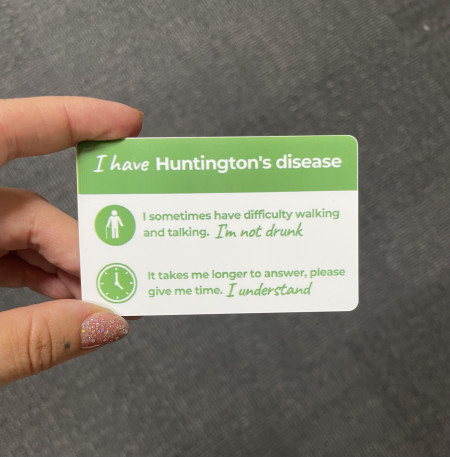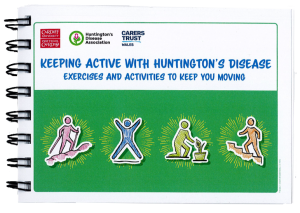Living with Huntington’s can have an impact on your finances, which can add to the challenge of what is already a difficult situation. It may become increasingly difficult for you, and members of your family who look after you, to work or study. Meeting your care needs can sometimes be costly, too.
There are different forms of financial help available to people living in England and Wales, from the Department of Work and Pensions (DWP), your local council and other sources.
It’s important to be aware of all the help you’re entitled to and to apply for any help that could make life easier.
Finding out what you are entitled to
The charity 'Turn2us' have an online benefits calculator which is free to use to see what benefits you might be entitled to: https://benefits-calculator.turn2us.org.uk/AboutYou
Disability benefits
Personal Independence Payment (PIP)
If you’re aged between 16 and 64, you may be entitled to claim Personal Independence Payment (PIP). This is intended to help with some of the extra costs caused by long-term ill-health or disability. You can get an idea of whether you’ll qualify for PIP, and which components and which rates you might get, on the c-App website.
If you need extra help because of the symptoms of Huntington’s disease and you are aged between 16 and 64 you may be entitled to claim Personal Independence Payment (PIP). You don’t need to have worked or paid National Insurance to qualify for PIP, and it doesn’t matter what your income is, if you have any savings or you’re working.
We have produced documents on PIP specifically for people with Huntington's:
- Top Tips – A guide to give you some helpful hints when applying for PIP / filling in the forms.
Download here
- A guide to categories – This may give you some helpful suggestions when filling each section of the form.
Download here
All of this information has been created based on the experience of our Advisers or of families; we have had support from the PIP assessors in writing it but it doesn’t replace advice that is available directly from the DWP at
gov.uk.
The DWP have made a series of videos which can help you when thinking about applying, or going through the application process:
- Supporting Information for PIP – This video looks at the supporting information you will need and why it’s important. If you are in touch with your local SHDA they can often write a supporting letter at this stage. Watch here
- The face-to-face assessment – Most people who apply for PIP will have a face-to-face assessment, this video gives more information about what will happen at that assessment. Watch here
- The PIP decision – this video explains how you will be informed if you have been successful and any next steps. Watch here
More information on PIP is available on the gov.uk website
Employment Support Allowance (ESA)
If you have a long-term illness, you may be entitled to Employment Support Allowance (ESA), whether or not you are currently working.
Help with Transport
- The Blue Badge Scheme
A Blue Badge lets you park in places other drivers can’t, so that you can park closer to the places you want to reach. With a Blue Badge you can usually (but not always) park for free. Some private car parks, e.g. at hospitals, may still expect you to pay.
You can apply for a Blue Badge online.
- Train travel
A Disabled person’s railcard costs £20 per year and entitles the holder and a carer or friend to one third off train tickets.
In Wales, you can also travel on some train lines for free if you have a Concessionary travel pass (see “Bus travel” below).
- Motability Scheme
The mobility element of your PIP can be used to lease a car, scooter or motorised wheelchair via the Motability Scheme.
- Bus travel
Disabled people are usually entitled to free or discounted bus travel in the UK, although the offer and eligibility criteria vary slightly between UK nations. You can find out more information and apply online here: England; Wales.
Help with equipment and adapting your home
- Disabled Facilities Grant
If your home needs to be adapted to meet your needs, you may be able to get a Disabled Facilities Grant from your local council to help with the costs. Usually, your occupational therapist will help you figure out what adaptations will work best for you.
A Disabled Facilities Grant won’t affect any benefits you get.
- Council tax reduction
If your council tax increases as a result of adaptations to your home, for example the building of an extension, you can apply to your council to have the increase removed, as long as the adaptation is as a result of your disability.
- VAT relief
People with a long term illness can get certain products, services and pieces of equipment they need without being charged VAT on top of the cost of the items.
The types of items covered include certain types of stairlifts, wheelchairs, adjustable beds, alarms, motor vehicles and building work.
Your supplier can advise you which items qualify for VAT relief, and will ask you to complete an ‘eligibility declaration’ form.
Financial help for carers
See also Carers/Financial help for carers.
Other grants
A wide range of grants are available, depending on your specific needs and situation.
Help with nursing home fees
If you need residential care, your local authority may help you with the cost of this. As this is means-tested, they will carry out a financial assessment to see if you are entitled to this kind of help, and if so, how much. This assessment will take into account your income and assets, such as any property you own. This includes the value or your home, unless your partner or other dependent lives there.
The Care Act 2014 is changing how people are able to pay for their own care, introducing the right for you to ask for the local authority to pay for the cost of your care while you try to sell your home. This is known as a "deferred payment scheme".
If your care is fully funded by your local council, they may also select your nursing home. You are free to make your own arrangements, but you might need to bear some or all of the cost yourself. It is worth asking the local authority for a financial assessment in any case, because they might pay some or all of your care costs.
Help with nursing home fees through NHS “continuing care”
If your medical needs are very high, they may meet the criteria for fully funded NHS care. This means that you will receive the care and support you need at no cost to you, including the costs of residential care if needed, or care in your own home.
This is known as NHS continuing healthcare or continuing care. It is a package of care that is arranged and funded solely by the NHS for individuals who are not in hospital and have been assessed as having a "primary health need".
You can find out more about NHS continuing care here: http://www.nhs.uk/Conditions/social-care-and-support-guide/Pages/nhs-continuing-care.aspx
NHS-funded nursing care
If you live in a residential care home or nursing home, but are not eligible for NHS continuing healthcare, you may still be eligible for NHS-funded nursing care.
This is nursing care provided to you in your care home by a registered nurse. The NHS will pay a flat rate contribution directly to the home towards the cost of this nursing care.
You may be eligible for NHS-funded nursing care if:
- you are not eligible for NHS continuing healthcare but have been assessed as needing care from a registered nurse
- you live in a care home registered to provide nursing care
You can find out more about NHS-funded nursing care here: http://www.nhs.uk/chq/Pages/what-is-nhs-funded-nursing-care.aspx
While coping with Huntington’s can be expensive at times, there are lots of different sources of help available. It’s important to make sure you get the support that you’re entitled to. Your local specialist Huntington’s Disease advisor (SHDA) can help and answer questions, and Citizen’s Advice can also provide, support, advice and advocacy.















